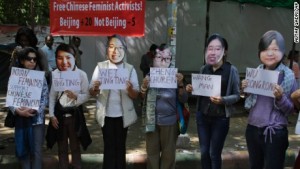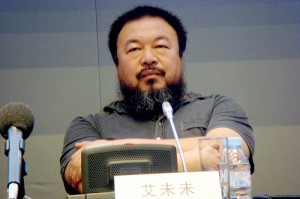Update – Good or Bad? Five Chinese Female Activists Released on “Bail”
 Normally it is an embarrassment when you get something wrong, but in this case, I could not be more relieved to be completely mistaken. Yesterday, I blogged that Wang Man, Wei Tingting, Zheng Churan, Li Tingting and Wu Rongrong would likely be officially arrested. However, last night, each was released “on guarantee pending further investigation” (取保候审), a concept akin to bail in the United States.
Normally it is an embarrassment when you get something wrong, but in this case, I could not be more relieved to be completely mistaken. Yesterday, I blogged that Wang Man, Wei Tingting, Zheng Churan, Li Tingting and Wu Rongrong would likely be officially arrested. However, last night, each was released “on guarantee pending further investigation” (取保候审), a concept akin to bail in the United States.
Human Rights in China goes into detail on the legal requirements of “release on guarantee pending further investigation” and as a result, we won’t go into further detail other than to say, this is not complete freedom. Basically, for the the next 12 months (CPL Art. 77 limits bail to 12 months), the women are at the whim of the local public security bureaus, allowed to be called in for questioning as the police further investigate the charges. Under the Criminal Procedure Law (“CPL”), the women’s freedom will be limited. They must remain in their home city and depending on what the police determine should be the conditions of their bail, they may be prevented from organizing any further demonstrations, activities or working together (see CPL Art. 69(2): may not meet or communicate with designated persons; CPL Art. 69(3): must not engage in designated activities). Their passports may also be taken away.
But again, although there is a written document that lists the conditions of their “release on guarantee pending further investigation,” no where in the Ministry of Public Security Regulations (“MPS Regulations” or “MPS Regs”) does it state that this document must be physically given to the suspects. In fact, the MPS Regulations only require that the conditions of bail be read aloud to the suspect (MPS Regs. Art. 79).
However, the fact that there is a release on “bail” is a positive development and many  have praised the international outcry for precipitating the women’s release. Certainly the international and media attention to the detention of these activists on the eve of International Women’s Day likely played a role in influencing some in the government to realize that backlash would only increase if these women were formally arrested.
have praised the international outcry for precipitating the women’s release. Certainly the international and media attention to the detention of these activists on the eve of International Women’s Day likely played a role in influencing some in the government to realize that backlash would only increase if these women were formally arrested.
But one can’t help but wonder whether this international influence is a double-edged sword in the current NGO environment in China. Presently, Chinese grassroots NGOs, who operate in a legal netherworld, have been under increasing scrutiny by the Chinese government with a draft Charity Law in the works that could make life more difficult for these organizations. The government’s goal: to determine how much funding the the domestic NGOs receive from abroad. It’s this international funding and influence that the Chinese government has begun to increasingly fear and view as a Western attempt to undermine the Chinese Communist Party (see Julia Famularo’s brilliant essay on this in The Diplomat). And it is not just domestic NGOs that the Chinese government is seeking to restrain. Allegedly a confidential, draft regulation or law, colloquially called the “Anti-Foreign Agent Law,” is in the works to regulate foreign NGOs working in China.
Thus, the international uproar, likely also a result of Chinese NGO Yirenping’s effective advocacy campaign for the freedom of their staff and former staff (three of the women are currently or have been affiliated in the past with Yirenping), while being applauded in the West, might be the type of example that will give supporters of a harsh Charity Law and severe Anti-Foreign Agent Act the evidence they need to make sure it passes as is.
 On Facebook
On Facebook By Email
By Email 



